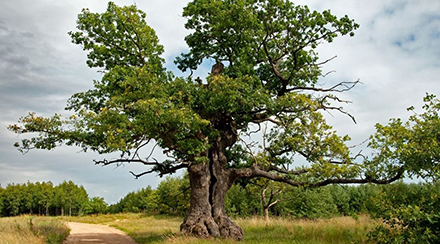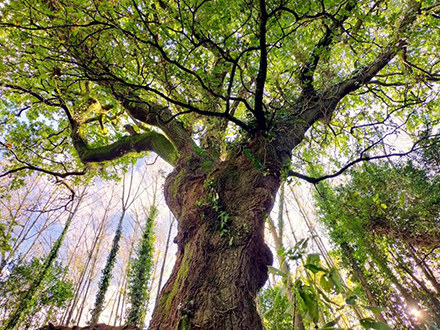Drinkers are boycotting Russian vodka. Small and large US cities are cutting ties with their Russian “sister cities.” And in one of the latest examples of symbolic efforts to isolate Russia from the rest of the world, a group in Brussels disqualified Russia’s candidate, an oak tree said to have been planted 198 years ago by the novelist Ivan Turgenev, from the European Tree of the Year competition. Source: The New York Times
“We cannot stand idly by and watch the unprecedented aggression of the Russian leadership against a neighbouring country,” the organizers of the competition, one of the largest competitions devoted to trees, said in a statement.
The European Tree of the Year competition was founded in 2011 as a way to celebrate the histories of old trees and develop bonds between nations around a subject that was seemingly as neutral as anything could be: trees. But with war escalating in Ukraine, even a competition devoted to celebrating trees found itself unable to remain separate from global politics.
At an awards ceremony in Brussels, the organizers announced this year’s winner: Poland, for a 400-year-old oak tree that organizers said had become a symbol of Polish resistance to aggression and its warm welcome to refugees from Ukraine.
The second place tree was a 250-year-old oak tree in the Santiago de Compostela region of Spain, and third place went to a 250-year-old cork oak tree in Vale do Pereiro, a village in Portugal.
The Polish tree sits in the Bialowieza forest, the last primeval forest in Europe’s lowlands, which stretches across the border of Poland and Belarus. This year, construction workers began work on a 115-mile, 18-foot-high metal wall through the forest, intended to block migrants, mostly from the Middle East and Africa, from crossing into Poland from Belarus.
When the candidates in this year’s competition were announced in early February, the tree was a symbol of the protest against that wall, said Josef Jary, one of the organizers. But since Russia invaded Ukraine, prompting more than three million people to flee across Europe, it’s become a symbol of the protection that Poland provided to some of them, he said.
Most of the 15 countries – 16 with Russia, that participated in the competition this year first held a national contest to select the year’s entry. They submit the winner to the European-wide competition, and then members of the public vote for their two favorite entries on the European Tree of the Year website. This year, nearly 770,000 votes were cast.
Some countries participate more enthusiastically than others. Rob McBride, the British liaison of the tree competition, said that every year, he struggles to rally support for the competition in Britain, which has never won.
“When it goes to Europe, people switch off a bit,” Mr McBride said. This year, Britain entered a hawthorn tree that was crowned British tree of the year in December, but Mr McBride said he voted for the Polish tree and the Spanish tree.
Mr McBride objected to Russia’s elimination from the competition, because he said what drew him to trees were their connections to shared histories.
“I’d rather keep politics out of nature projects and trees especially,” he said. “Trees are apolitical.”
Mr Jary, who is based in Brussels, said the decision to join other cultural and sports groups in boycotting Russia was painful.
“I can imagine a lot of normal Russian people without any political interest voted for their lovely tree, and they were very disappointed,” he said, but added that the organizers felt it was necessary to protest President Vladimir Putin’s invasion of Ukraine.
While grass-roots efforts are largely symbolic and do not carry the weight of sanctions and other restrictions on Russian financial institutions, they still leave Russians isolated from the rest of the world.
In a letter to the competition’s organizers, Sergey Palchikov, Russia’s tree competition liaison, said that Russia was withdrawing indefinitely and would focus its national competition.
“With unconcealed surprise and chagrin, we learned that the Russian tree, the famous Turgenev Oak, planted by the hands of the great Russian writer Ivan Turgenev and killed by a hurricane at the end of last year, was practically killed with your help for the second time,” Mr Palchikov wrote, pointing out that Russia’s trees were among the winning trees in previous years.
Those results had themselves been the subject of some controversy. Last year, the competition’s organizers announced they had identified “attempts to distort the just competition and deceitfully influence the results” in favor of one of the entries – Russia’s, Mr Jary said. Mr Palchikov said he did not know who was responsible for the fraudulent votes.
Ludek Niedermayer, a member of the European Parliament, said he fully supported the decision to ban Russia from the competition because it would be unacceptable to celebrate together with Russians right now, given the events unfolding in Ukraine. Competitions like the Tree of the Year help engage members of the public, and engagement and awareness is crucial for building a better, more peaceful and connected world, he said.
“It makes people active, and people that are active care about what’s going on,” he said. The tree competition “shows us we’re different, but in many things we’re similar, we can talk to each other, compete and cooperate.”







